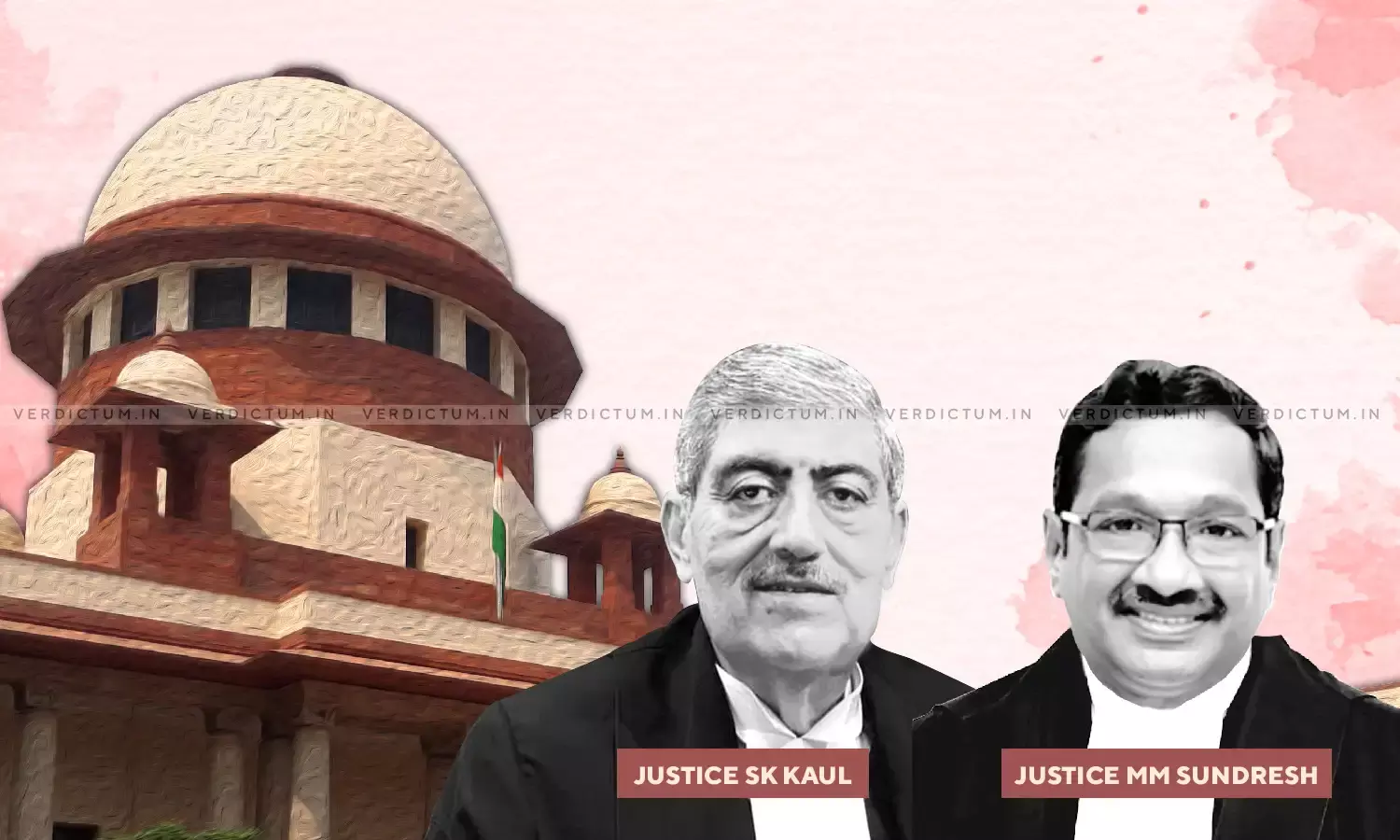Rule 3 Of Kerala Service Rules - Pendency Of Judicial Proceedings At Stage Of Retirement Cannot Disentitle State From Withholding DCRG - SC

A two-judge bench of Justice Sanjay Kishan Kaul and Justice M.M. Sundresh while setting aside a full bench judgment of Kerala High Court has held that Rule 3A of the Kerala Service Rules (KSR) cannot be read in isolation nor the latter part of it struck down as done by the High Court. The Court also held that pendency of disciplinary or judicial proceedings cannot disentitle the State from withholding Death Cum Retirement Gratuity (DCRG).
Further, the Court discussed the important aspect as to whether Rule 3A is to be construed in the context of Rule 3 or should be read independently of itself. The High Court took a view that Rule 3A is in a sense assisting Rule 3 and does not have any independent existence. The view was altogether rejected by the Apex Court.
The Respondents K. Chandran and D. Alexander both were awarded imprisonment and fine or a certain sum in their respective trials by the Trial Court. Both the Respondents filed appeals to Kerala High Court which subsequently set aside their convictions. Later applications were filed for the release of DCRG by both the Respondents. In the case of K. Chandran, his application was rejected by the Kerala Administrative Tribunal on the ground of acceptance being against the purpose of Rule 3A of KSR while D. Alexander's application to release DCRG was accepted and the Kerala Administrative Tribunal directed for its release.
When the petition reached before the Kerala High Court the only issue to be examined by it was whether pending criminal appeal and with the sentence being suspended, could the DCRG be directed to be released on the construction of the applicable rules.
The High Court opined in favor of the Respondent-employees and struck down the latter part of Rule 3A.
The issue which was dealt with by the Court was -
Whether an employee is entitled to the release of his Death cum Retirement Gratuity on the conviction in a criminal case for violation of integrity norms in performance of official duties though an appeal remains pending before the High Court.
The Court referred to the rule 3A or KSR which reads as
"(a) Where any departmental or judicial proceedings is instituted under Rule 3 or where a departmental proceeding is continued under clause (a) of the proviso thereto, against an employee who has retired on attaining the age of compulsory retirement or otherwise he shall be paid during the period commencing from the date of his retirement to the date on which, upon conclusion of such proceeding final orders are passed, a provisional pension not exceeding the maximum pension which would have been admissible on the basis of his qualifying service up to the date of retirement, or if he was under suspension on the date of retirement up to the date immediately preceding the date on which he was placed under suspension, but no gratuity or death-cum-retirement gratuity shall be paid to him until the conclusion of such proceeding and the issue of final orders thereon.
(b) Payment of provisional pension made under clause (a) shall be adjusted against the final retirement benefits sanctioned to such employee upon conclusion of the aforesaid proceeding, but no recovery shall be made where the pension finally sanctioned is less than the provisional pension or the pension is reduced or withheld either permanently or for a specified period."
Stating its view of Rule 3A, the bench held, "We must keep in mind very objectives of holding back pension or the DCRG. One can be to recover the amounts found due from the delinquent employee of any nature whatsoever after appropriate notice and proceedings. The second eventuality is if an employee is dismissed from service. It can hardly be doubted that in the second eventuality of the dismissal from service the employee would lose all retirement benefits."
The Supreme Court noted that Note 2 to Rule 3 provides that the liabilities fixed against an employee or a pensioner can be recovered from DCRG without the departmental/judicial proceedings referred to in this Rule but after giving an employee or pensioner concerned a reasonable opportunity to explain. And Note 2 is further clarified by Ruling No. 3, which stipulates that Note 2 does not mean that the employee's or pensioner's consent should be obtained for recovering the liabilities from DCRG but contemplated that only communication of such liabilities is to be made.
After referring to Rules 3, 3A, note 2, and Ruling 3, the Court held that Rule 3A cannot be read in isolation but has to be read with the beforementioned.
The Supreme Court further clarifies that it is a very restrictive view to disburse DCRG on account of the proceedings against a pensioner coming to an end, even where a conviction has arisen. This is especially so where the convicted person has availed of the remedy of appeal. An appeal is a continuation of the proceedings in trial and would be, thus, a continuation of judicial proceedings.
Accordingly, the appeals were allowed and the impugned judgment of the Kerala High Court was set aside.
Click here to read/download the Judgment

